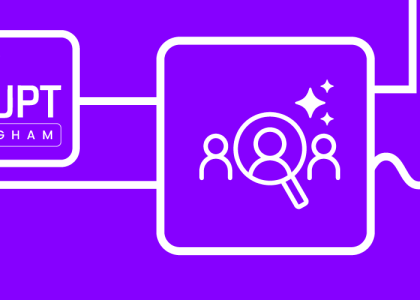Why businesses must still invest in entry-level jobs and graduate schemes in the age of AI in recruitment

The job market is volatile, and for many young people, finding meaningful workplace opportunities is becoming increasingly difficult. Many point to AI as a reason, especially AI in recruitment. Let’s unpack that and see where you can ensure fairness and a meaningful talent pipeline.
The age of AI
The development and adoption of AI in businesses is accelerating at a rapid pace. Every day, companies take another step toward a more technologically advanced way of working. While this transformation has many benefits for efficiency and innovation, the impact on the workforce, and especially those just trying to enter it, is far less positive.
Since the release of ChatGPT, research by Adzuna has shown that vacancies aimed at graduates have fallen to their lowest level since COVID-19. Now, entry-level roles account for just a quarter of the job market, down from 28.9% in 2022.
When I graduated in 2024, I noticed how competitive the job market had become. Friends of mine were applying to over two hundred jobs and receiving nothing but silence. AI may not be the only reason for a stagnant job market, but it definitely makes things harder. Additional uncertainties and job insecurity also add to worries that those of us lucky enough to find work may be replaced.
This threat of being replaced is only set to grow. The CEO of Anthropic, a leading AI company, recently warned that AI could replace up to half of all entry-level jobs in as little as five years.
Talent gap of the future
Think ahead just 10 years. Many experienced professionals will retire, and without a pipeline of younger employees trained and developed, businesses will lack the talent to replace them.
Skill shortages are a very real risk that will impact long-term growth and competitiveness.
The value of fresh ideas
Entry-level employees and graduates bring something AI cannot: curiosity, new perspectives, and creativity. They challenge old ways of thinking and push businesses toward innovation.
“I think that graduate schemes are a strong investment for any organisation because they bring in fresh talent, energy and new perspectives. At MHR, our two-year rotational programme gives graduates the opportunity to gain hands-on experience across different areas of the business, developing a broad skillset and strong commercial understanding. This not only supports their personal growth but also ensures we retain motivated, well-rounded professionals who are aligned with our culture and ready to drive long-term success,” says Julia Roberts, Academy People Development Trainer at MHR.
A workforce dominated only by established professionals and AI risks becoming too comfortable and resistant to change. Fresh talent injects energy, adaptability, and fresh thinking into an organisation, which is essential for sustainable, continuous growth.
Investing where it matters most
Upskilling existing employees in AI is valuable, but focusing only on short-term efficiency overlooks the bigger picture.
Graduates and school leavers are at the start of their career journeys and have decades ahead of them. We grew up with cutting-edge tech as an innate part of our lives. That means we’re full of potential, especially in regard to technology adoption.
Mentoring
One of the best ways that businesses can secure continuity and long-term success is through mentoring schemes.
“Mentoring is valuable because it gives people the chance to learn from someone with more experience, helping them build confidence, develop skills and find direction in their career. It also offers support and encouragement, as well as access to fresh ideas and new opportunities. At the same time, mentors benefit by reflecting on their own practice and developing their leadership skills, making it a positive experience for both sides," says Roberts.
To develop future leaders and CIOs, mentoring remains the most powerful tool for employee growth. Mentors bring lived experience, practical insights, and life lessons that technology simply cannot replicate.
Through mentoring, junior employees not only gain opportunities to grow, but mentors and organisations also play an active role in shaping the next generation of high-performing talent, ensuring they are aligned with company values, culture and processes.
Why AI is not the enemy
AI can be seen as a threat to graduates and job seekers, but this view misses the bigger picture. AI is not here to replace people; it is here to support them, enhance their work, and open new opportunities.
It is important to think of AI not as an enemy but as a smart assistant, making tasks easier and saving time. A good AI system will accelerate routine tasks and augment complex ones. Those who learn to adapt and harness its potential will be best placed to succeed in a changing job market.
AI is already delivering huge benefits to organisations. By transforming the way businesses operate, it is making them more streamlined, efficient, and high-performing. Routine administrative tasks are reduced, saving time and cost, while enabling employees to focus on meaningful strategic work that drives growth.
AI in recruitment also has the potential to be incredibly powerful, as long as it’s used with transparency, accountability and fairness in mind. Making sure you follow guidance for best practice, still involve the human touch in the process and query your data and you’ll uncover truly excellent candidates at all experience levels.
But the advantages of AI are not limited to businesses; graduates and job seekers can benefit greatly too. Research shows that nearly 40% of graduates now use AI to strengthen their job applications, whether by polishing CVs and cover letters, drafting documents, or preparing for interviews. This efficiency allows candidates to apply for more opportunities, increasing their chances of success.
Rather than approaching AI with apprehension, graduates should see it as a valuable resource for personal growth and innovation. By understanding how AI is transforming the job market and learning how to work alongside it, graduates and early-career professionals can turn these challenges into opportunities.
By gaining knowledge in AI and related technologies, they can strengthen their employability, stay ahead of the curve, and position themselves to thrive in the workforce of tomorrow.
AI and graduates: a partnership for future growth
Graduates and entry-level employees should be seen as strategic investments for any organisation. They bring fresh ideas, energy, and curiosity, forming the foundation of sustainable growth and helping businesses remain dynamic, resilient, and competitive in a fast-changing world.
In today’s workplace, graduates and AI should not be competing against each other but complementing one another.
Humans excel in tasks that require contextual understanding, creativity, and emotional intelligence, while AI thrives in handling repetitive, high-volume, and data-driven work. Together, they create a powerful balance. Graduates generate fresh perspectives and ideas, and AI transforms those ideas into actionable outcomes quickly and efficiently.
By combining the potential of young professionals with the capabilities of AI, businesses can build a workforce that is not only technologically advanced but also future-ready. Companies that fail to recognise this balance risk facing a long-term talent crisis, missing out on the next generation of thinkers, innovators, and leaders.
All this leads back to the fact that investing in new employees is essential. Graduate schemes and entry-level roles lay the groundwork for sustainable growth, while AI acts as the tool to help them reach their full potential. Investing in young talent today is the only way to secure innovation and continuous success tomorrow.



